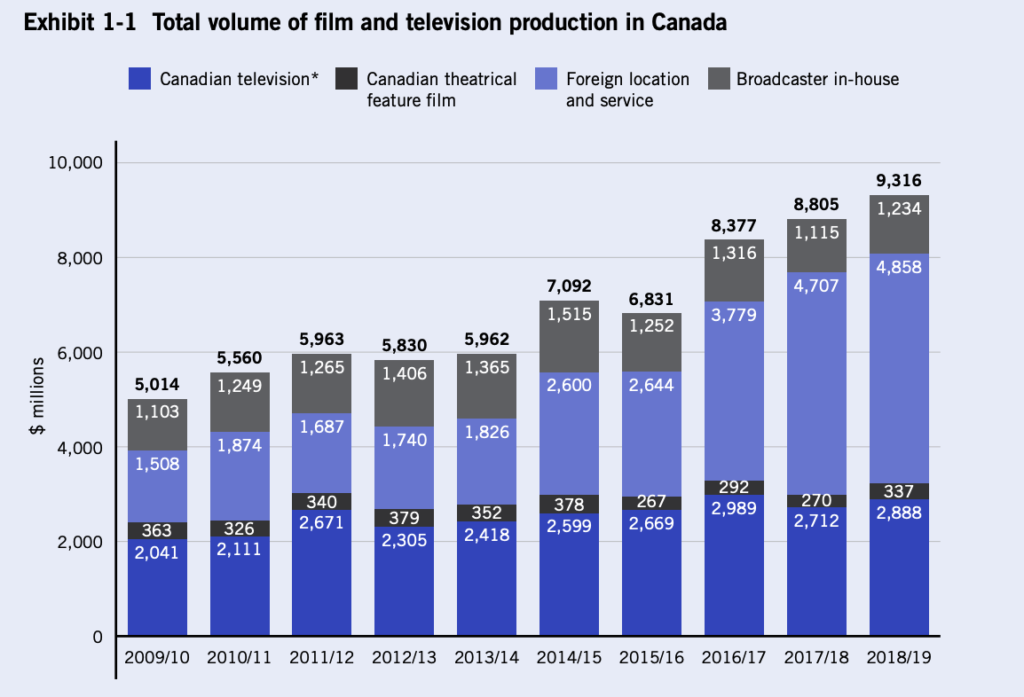Canadian Heritage Minister Steven Guilbeault is set to introduce his “Get Money from Web Giants” Internet regulation bill on Monday (update: the bill is on the notice paper, but may be delayed until Tuesday). Based on his previous public comments, the bill is expected to grant the CRTC extensive new powers to regulate Internet-based video streaming services. In particular, expect the government to mandate payments to support Canadian content production for the streaming services and establish new “discoverability” requirements that will require online services to override user preferences by promoting Canadian content. The government is likely to issue a policy direction to the CRTC that identifies its specific priorities, but the much-discussed link licensing requirement for social media companies that Guilbeault has supported will not be part of this legislative package.
These reforms mark the culmination of a dramatic reversal in government digital policy. After then-Heritage Minister Melanie Joly unveiled her 2017 digital cancon strategy that focused on market-based solutions and emphasized exports of Canadian culture, extensive lobbying gradually let to a major policy flip flop. The CRTC reversed its prior position on Internet streaming regulation in 2018 with a regulate-everything approach, the deeply flawed Yale report released earlier this year provided the blueprint for CRTC-led regulation, and Guilbeault jumped on board with a declaration that his top legislative priority was to “get money from web giants.”
On Monday, the government will undoubtedly line up the lobby groups that supported the reform to provide positive quotes, suggest reforms will lead to billions in new revenues, and claim the bill ensures regulatory fairness by requiring that everyone contribute. Yet much of the policy is based on fictions: that this levels the playing field, that there is a Cancon crisis, that discoverability requirements respond to a serious concern, that this will result in quick payments to the industry, that this is consistent with net neutrality, or that consumers will not bear the costs of reform.
None of this is true. But beyond those issues – each discussed in further detail below – this most notably represents a significant new source of speech regulation. We do not require government authorization to publish newspapers, blog posts, or to simply voice our views in a public forum. That we require governmental authorization in the form of licensing for broadcasters was largely justified in furtherance of cultural policies on the grounds of limited access to scarce spectrum. That justification simply does not apply to the Internet, no matter how many times Guilbeault refers to the inclusion of Internet companies within the “broadcast system.” This is not a matter of Internet exceptionalism. Laws and regulations such as taxation, competition, privacy, and consumer protection are all among the rules that apply regardless of whether the service is offline or online. But speech regulation by the CRTC should require a far better justification than the lure of “free money” from Internet companies.
Indeed, to justify this Internet regulation under the guise of broadcast reform requires a policy foundation that simply isn’t there. Consider the following ten issues:
1. “Level Playing Field” claims do not stand up to scrutiny
Canada implemented mandated contributions to support the creation of Canadian content years ago, maintaining that broadcasters and broadcast distributors such as cable and satellite companies benefit from the “system” and therefore should be required to contribute back to it. The system does indeed provide broadcasters and broadcast distributors with many regulatory advantages. These include lucrative simultaneous substitution rules that allow them to replace U.S. commercials with Canadian ones, foreign investment restrictions that limit competition, must-carry regulations that mandate that certain channels be purchased by consumers in even basic cable packages, copyright rules that legalize redistribution of broadcast signals, and protection to keep U.S. giants such as ESPN and HBO out of the market.
That is the Canadian “system” and, given the benefits, mandated contributions are best viewed as a regulatory quid pro quo. Internet-based streaming services are not beholden to this system, however. Notwithstanding calls for a “level playing field”, they do not enjoy any of the Canadian broadcast regulatory advantages. Simply put, there is no free ride. Rather, Canadian and foreign streaming services are equally subject to lightweight regulations, reflecting a business model that depends upon on winning consumer choice rather than regulatory favour.
2. There is no Cancon crisis
Despite claims that the absence of mandated contributions from Internet streaming services have harmed the Canadian film and television production sector, industry data over the past decade tells a much different story. Indeed, there has been record setting film and television production in recent years, much of it supported by companies such as Netflix. CRTC chair Ian Scott last year said that Netflix is “probably the biggest single contributor to the [Canadian] production sector today.” While that is not entirely true – the data suggests that Canadian taxpayers are the biggest contributor with federal and provincial tax credits consistently the largest source of financing – the claim that foreign streamers do not contribute to film and television production in Canada without a regulatory requirement is simply false.

CMPA Profile 2019, Exhibit 1-1, Pg. 7, https://cmpa.ca/wp-content/uploads/2020/04/CMPA_2019_E_FINAL.pdf
The overall financing picture shows an industry that has had record amounts of investment in film and television production with the total amount nearly doubling over the past decade. Further, certified Cancon has also grown in recent years, with the top two three years for certified Cancon television production occurring over the past three years. In fact, last year was the biggest year for French language Cancon over the past decade.
The data at the provincial level provides further confirmation of record-setting production. Earlier this year, Ontario Creates, the Government of Ontario’s agency for cultural creation, touted a “record breaking year” for Ontario’s film and television production sector, citing more than $2 billion in production spending for 343 productions. Of the $2.1 billion, there was a near-even split between domestic and foreign production: $1.1 billion in foreign production and $1 billion on domestic productions.
3. This will hurt Canadian broadcasters and outsource the future of Cancon to U.S. companies
Mandated Canadian content spending for companies such as Netflix is likely to require the companies to pay into a fund that supports Canadian content production. However, the current rules make it challenging for those same companies to access those funds for their own productions. That leads to either a trade challenge for being forced to pay into a system that is inaccessible to foreign providers or a reform to the system that would open things up to foreign providers and in the process undermine the competitiveness of domestic producers and broadcasters who are more reliant on tax credits and funding programs.
Alternatively, the government could require these companies to spend a percentage of their domestic revenues on Canadian content. This would significantly increase the domestic demand for Cancon in order to fulfill regulatory obligations. While that is a benefit to some Canadian producers, it could leave Canadian broadcasters – including the CBC – priced out of their own market. Left unable to compete for the very best Canadian content, the Internet giants such as Netflix and Amazon would be left as the de facto custodians of Canadian content.
4. The “discoverability” requirements are a solution in search of a problem
The government will want the CRTC to establish “discoverability” requirements aimed at increasing the prominence of Canadian content on Internet streaming services. While that approach is consistent with a recommendation from the Yale report, evidence of a problem is remarkably thin. The panel cited two studies to support the claim that Canadian content is hard to find. The first was a 2017 Price Waterhouse Cooper report called How Tech Will Transform Content Discovery, which involved a survey of 1,000 U.S. residents, had nothing to do with Canada, and said absolutely nothing about the ability to find or recognize Canadian content. The second was a 2016 report from Telefilm Canada titled Discoverability: Toward a Common Frame of Reference Part 2: The Audience Journey. That report was focused on Canada but did not find that Canadians have trouble finding Canadian content. Rather, it found a range of experiences and emphasized that “word-of-mouth is Canadians’ main discoverability method.”
In fact, it is not hard to discover Canadian content on services such as Netflix. Last year, I wrote about this issue, creating a fresh Netflix account to see whether I could find Canadian programming and if the Netflix algorithm would adjust to my interests. The reality is that “discovering” Canadian content on Netflix only requires typing Canada into the search box. That immediately generates a Canadian Movies and TV section that features many shows and movies. Typing “Canadian” generates tabs for Canadian TV Shows, Canadian Movies, and Critically-acclaimed Canadian Movies, Canadian TV Comedies, and much more.
For years, the Canadian cultural sector has claimed that Canadians want access to Canadian programming. If true, that provides Internet streaming services with all the incentive they need to ensure that they offer Canadian programming and that it is easy to find. With no long term commitment and plenty of competition, subscribers will leave if they do not find programming that appeals to them. If the culture sector is right, their success in Canada is directly linked to offering Canadian programming and ensuring that their subscribers are able to find it. In this scenario, it is not regulation that drives access to Canadian content but rather subscriber demand.
5. “Discoverability” requirements could harm Canadian cultural exports..
Not only are discoverability requirements unnecessary, but they could be harmful. If a company like Netflix is required to continuously display Canadian content based not on what a user’s preferences suggest but rather in compliance with CRTC regulations, that content is likely to get down-voted by many of the company’s subscribers. That will not have an impact on the Canadian display of the content (which is there due to the CRTC, not subscriber preference), but it would impact the content on the global stage as the algorithms would account for the down-voting in minimizing display of the same content outside of Canada. In other words, the discoverability mandates could create a reversal of the export success of Schitt’s Creek. Rather than promoting the program to the world, the platforms would try to hide them given a negative feedback loop that pushed unwanted content at their subscribers in Canada.
6. …and raise net neutrality concerns
The discoverability requirements also raise net neutrality concerns. Canadian net neutrality rules prohibit powerful intermediaries (namely ISPs) from using their position as network providers to give themselves an undue preference (eg. grant a preference for their content over third party content) or interfere with content that runs on their network. The CRTC used these provisions to establish the Internet Traffic Management Practices of ISPs in 2009 and the Differential Pricing Practices decision in 2017.
While the focus of net neutrality is rightly on telecom companies, discoverability requirements will limit the ability for services to have the full freedom to choose their content or the manner in which it is displayed. The same limitation applies to Canadian users, who will have no alternative but to access the CRTC-approved version of the site or service, not necessarily the version they would prefer. This not only restricts user choice, but harms creators themselves, as Lilly Singh pointed out in this Globe and Mail op-ed.
The end result is that even if Netflix subscriber or Youtube user that believes the Internet streaming services will do a better job than the CRTC of identifying and displaying the content they might want to watch, they get the CRTC version. In fact, the CRTC addressed the issue of whether promoting Canadian content through differential pricing would be a net neutrality violation in 2017, a decision that was lauded by the Liberal government including then-Canadian Heritage Minister Melanie Joly, who stated afterward that “we profoundly believe in the freedom of the Internet and net neutrality and we are committed to it.” No longer.
7. Tariff retaliation under the USMCA is a possibility
The USMCA features a broad cultural exemption that covers a wide range of sectors which means that commitments such as equal treatment for U.S., Mexican and Canadian companies may be limited within the cultural sector. Yet the cultural exemption did not come without a cost. The government rarely mentions it, but the agreement also includes a culture “poison pill” designed to discourage use of the exemption. It grants the U.S. the right to levy retaliatory measures of “equivalent commercial effect” in response to Canadian policies that would otherwise violate CUSMA if not for the exemption.
Legislative reforms that establish requirements to pay levies to fund Canadian content without full access to the same funding mechanisms enjoyed by Canadian firms or discoverability requirements that limit the manner that information is conveyed on websites and services would raise the possibility of retaliation. Since the provision does not limit retaliation to the cultural sector, the U.S. can be expected to target sensitive areas of the Canadian economy such as the dairy or steel sectors. This was the U.S. strategy last year when responding to a French plan to levy a new digital tax, which led to threats to impose US$2.4-billion in tariffs against French goods such as wine, cheese and handbags.
8. Guilbeault avoids addressing the real Canadian content issue, namely what is Cancon?
The government will emphasize the need to support Canadian stories, but steadfastly avoids grappling with the question of whether the Canadian system for certifying Cancon actually produces Canadian stories. In fact, the not-so-secret reality of the Canadian system is that foreign location and service production and Canadian content are frequently indistinguishable. Qualifying as Canadian requires having a Canadian producer along with meeting a strict point system that rewards granting roles such as the director, screenwriter, lead actors, and music composer to Canadians. Yet this is a poor proxy for “telling our stories”. Just how poor of a proxy? Take my Cancon quiz of 20 film and television programs, all of which are either Cancon certified, based on works written by Canadians, feature Canadian performers, or are rooted in Canada.
9. It will take many years to inject new money into the system
The government has oddly suggested that the proposed measures to get money from web giants is the fastest way to inject money into the system. Yet anyone with even a passing familiarity with CRTC process knows that the opposite is true. Empowering the CRTC to regulate Internet services and issues a policy direction pushing it toward mandated Cancon support, will invariably lead to a regulatory process that will take years to unfold with a call for public comment, a lengthy hearing, the initial decision, applications to review and vary the decision, judicial reviews, cabinet appeals, and potential judicial appeals. If any of the appeals are successful, the CRTC would be required to re-examine its decision and the process starts anew. Indeed, the telecom equivalent is criticized specifically because it takes so long to arrive at a final decision. In short, there will have been at least one and possibly two federal elections by the time anyone gets money through this regulated approach.
10. Canadian consumers will bear the cost of reform
With mandated payments or spending requirements alongside a new regulatory burden, there are real costs being imposed on these services. So what, some will argue, noting that these are big companies that can afford it. Yet the reality is that someone is going to pay for fees that are projected to run into hundreds of millions of dollars and the safe bet is that it is going to be Canadian consumers. The Canadian digital market will garner a red flag for would-be entrants, who may either increase subscription costs to offset the cost of doing business or block Canadian users to simply eliminate the regulatory hassle. Either way, Canadian consumers pay with higher fees or less choice.
Indeed, the likelihood of higher subscription costs runs counter to comments from Prime Minister Justin Trudeau in the House of Commons in 2018. When asked about making “web giants pay their fair share” he responded:
Mr. Speaker, once again, the NDP is claiming that Netflix and other web giants are the ones who will pay these new taxes. The reality is that taxpayers will be the ones to pay those taxes. We, on this side of the House, promised not to raise taxes for taxpayers who are already paying enough for their digital subscriptions and Internet.
Trudeau was right in 2018. Canadians already pay too much for Internet and wireless access and increasing the cost of Internet services will render those services less affordable with reduced choice for millions of Canadian consumers. The right way to make the services pay is through conventional taxation, but this will apparently be left for another day.











I know its highly unlikely but it would be hilarious if this sort of bill passed and the video streaming sites just said screw it, pulled out of the Canadian market and start geoblocking all Canadian IP addresses.
Bang on! The Internet Society Canada Chapter responded to the Yale Report in much the same terms: that declaring parts of the Internet to be “broadcasting” was unconstitutional for offending freedom of speech and was going to fail. Nothing has changed.
Pingback: ● NEWS ● #MichaelGeist #canada ☞ Heritage Minister Steven Guilbeaul… | Dr. Roy Schestowitz (罗伊)
Pingback: Federal government to web giants: “BOHICA!” « Quotulatiousness
Canadians will always bear the cost of reform 🙁
I don’t know if it’s stupidity or arrogance that makes the government and the cultural sector think that Netflix and the other American media companies will meekly go along with these requirements. They could devastate the Canadian media sector by:
1) Announcing they will not comply with these requirements and that the CRTC will have to try and collect any fees or fines imposed by it through the American court system.
2) Announce that if these proposals become law that they will cease producing content in Canada.
3) Announce they will stop carrying Canadian content outside of Canada.
4) Announce that the American networks will either cease selling content to Canadian networks or will double or triple the prices.
5) Make a political issue of “The Canadian government sanctioned theft” of American TV signals by Canadian cable networks (ABC, NBC, CBS, Fox and PBS receive nothing from Canadian cable companies)
The American companies will vigorously fight these proposals because if they don’t then other countries will copy Canada’s requirements.
Pingback: November 2-3, 2020 – The Friendly News Brief
Pingback: Justin Trudeau Moves to Regulate Netflix, Spotify to Push Canadian Content – Thinking Port
Is Canadian culture that pathetic and worthless that it needs to contort the internet, force taxation/fees on others, grab money from anything and everyone, ask or force or conspire so the rest of the planet pays such culture?
The internet gives you a planetary reach of clients. If you can’t use that amazing tool without bending (or trying) out of shape… then you’re really worthless.
All matters were considered, for reform is a very difficult thing.
Pingback: News of the Week; November 4, 2020 – Communications Law at Allard Hall
Get money from the web
https://jiji.ng/ikeja/store-equipments/fake-money-counterfeit-money-detector-mu1tKfLWvnzpWNTSM0J7okfA.html?lid=Ca_NgIsoMQSx_fm_&cur_pos=1&pos=3&ads_count=25846&ads_per_page=22&page=1